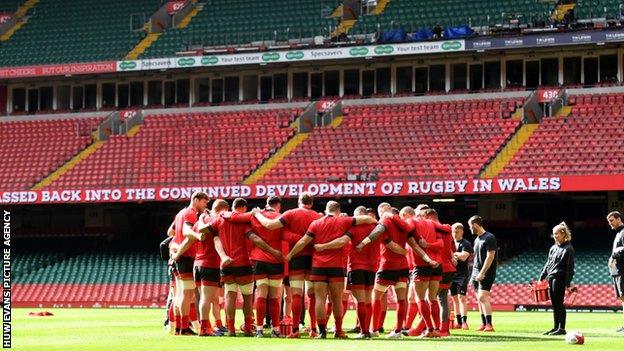Gareth Davies: WRU chairman admits 'catastrophic' coronavirus effect
- Published

Wales' Six Nations match against Scotland was postponed in March
Chairman Gareth Davies says the effect of coronavirus has been "catastrophic" on the Welsh Rugby Union's budget.
He told the Senedd's Culture, Welsh Language and Communications committee the last minute postponement of Wales' Six Nations match against Scotland on 13 March cost the union £10m.
The union's annual turnover is £90m, while government financial assistance could be an option for WRU.
"It's going to be a tough one to recover from," he said.
"The word to describe it all is catastrophic. The first impact on us was the postponement of the Wales Scotland game."
Wales are scheduled to host seven Test matches from October 2020 to March 2021 with four autumn internationals and a possible three Six Nations games, including the rearranged game against Scotland.
WRU chief executive Martyn Phillips told BBC Sport Wales in May the governing body would lose £50m of revenue if no autumn internationals and 2021 Six Nations games were staged.
"The professional game will take a huge hit and the sad thing about it is we were in a good position financially this year," said Davies.
"You can just do the maths on the one game I mentioned earlier and see what's ahead of us in the next 12 months if those six Test matches don't take place.
"There are some huge challenges."
The November matches against New Zealand, South Africa, Argentina and Fiji are still scheduled to go ahead with a Six Nations style tournament the back-up if those sides cannot travel.
Davies said he would prefer those games to go ahead even if they were behind closed doors.
The also confirmed Cardiff City Stadium, Liberty Stadium and Parc y Scarlets were the leading options if the Principality Stadium was unable to host autumn matches because of the ground being turned into an NHS field hospital.
Funding shortfall

Gareth Davies is a former Wales captain who played 21 times for his country between 1978 and 1985
When asked directly by BBC Sport Wales, Davies would not reveal whether they were seeking an immediate Welsh Government financial loan to help fill the void.
Davies would just say they are "looking at all options" but government aid will be one of the primary choices.
He did admit they were considering asking for something similar from the £80m World Rugby relief fund, but insisted no board discussions had been held about re-mortgaging the Principality Stadium.
"We have worked closely with the Welsh Government who realise what rugby means to Wales with the community side and often they are the real hubs of communities in Wales," Davies told BBC Sport Wales.
"There is also realisation what the Principality Stadium means in bringing economic benefits to Cardiff and Wales. We will continue our debates to outline the challenges we face so we are in continual discussions with the government.
"There is a possibility of looking at a loan or a grant from World Rugby down the track.
"The union was in a fairly healthy situation before this pandemic so we have some reserves which we are using now.
"They can only sustain us for a certain time and we are looking at all options."
Sobering reality
So Welsh rugby faces a stark economic situation which would be helped by any future government financial assistance.
The Professional Rugby Board (PRB), made up of representatives of Cardiff Blues, Dragons, Scarlets and Ospreys and the WRU runs the professional game in Wales.
The WRU's income in the 2019 annual report was £90.5m with more than half of that coming from international matches.
Any cancelled Test matches would directly affect the amount of money issued to the four Welsh regions.
In the report, the WRU said they invested £33m into the professional game which includes contributions to running the Dragons which the governing body own.
There were suggestions the money going to the regions could even drop to £3m next year if the loss of revenue continued and if the worst-case scenario becomes reality.
Gareth Davies says the WRU would be keen for Anthony Joshua to fight in Cardiff
The 320 clubs that make-up the community game have £11.8m ring-fenced under the new agreement with the governing body.
The injection of CVC investment into the Pro14, gives the governing body a £30m cash boost but that comes over a period of time.
In March, Wales coach Wayne Pivac and WRU chief executive Phillips were among the senior staff who took a 25% pay cut, while other staff members took a 10% wage cut.
In April, Welsh players from the regions agreed a 25% pay cut over three months as the sport dealt with the financial impact of coronavirus.
That took them until 1 July and further reductions have been mooted but players have reacted strongly to what they see as mistakes in how the regional game has been historically managed.
They are now waiting to return to training ahead of the Pro14 resumption with the dates of 29 June and 6 July in their diaries.
The Guinness Pro14 is hoping to return to action on 22 August with two rounds of localised fixtures behind closed doors with Parc y Scarlets and Liberty Stadium options to host those matches.
Some regions face a conundrum where to train with venues acting as field hospitals or testing centres.
Cardiff Blues are looking for facilities with the Arms Park out of action, while Ospreys have plans to switch to St Helen's in Swansea with their usual Llandarcy training base currently a hospital.